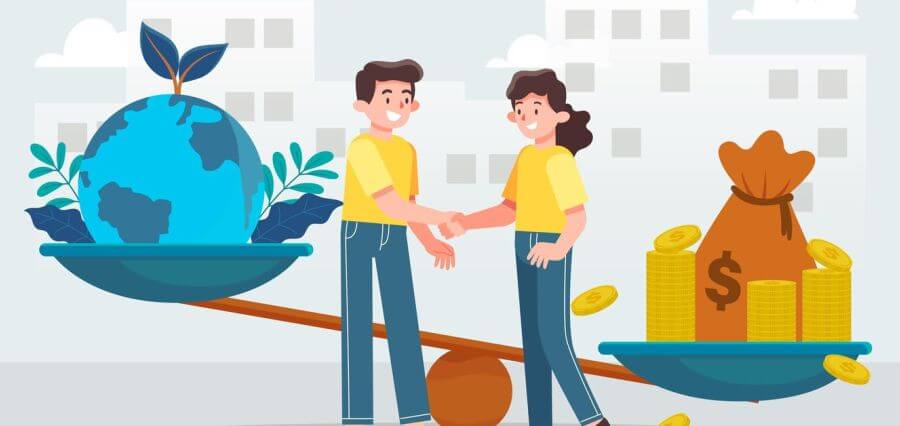People across the world are growing increasingly aware of environmental challenges. As a result, the idea of sustainable swaps has become more than just a trend; it has become a necessity.
According to FasterCapital, sustainable swaps are eco-friendly alternatives to everyday products that reduce environmental impact. These swaps often involve replacing single-use or non-recyclable items with reusable, biodegradable, or recyclable options.
Examples of swaps include using a stainless steel water bottle instead of plastic and cloth bags instead of single-use plastic ones.
Homes & Gardens suggests that these changes go beyond merely replacing plastic bottles with reusable ones or opting for cloth towels over paper towels. They represent a holistic approach to living that impacts various facets of life.
Sustainable swaps contribute to a healthier planet, but their benefits extend well beyond environmental impact, influencing economic, social, and personal well-being. Here are a few significant ways sustainable swaps help more than just our environment.
Economic Savings and Growth
As seen on 4Ocean, embracing sustainable swaps can lead to considerable economic savings for individuals and communities. For instance, switching from single-use plastic bottles to reusable ones reduces the constant need to purchase bottled water, leading to cost savings over time.
When you visit a website that sells such alternatives, you might be a bit surprised at first. After all, everything you’ve used will seem a bit pricier here. However, in the long run, these sustainable or reusable products will save you money over time.
On a larger scale, the adoption of sustainable practices fosters economic growth. The demand for sustainable products spurs innovation and creates new market opportunities.
Health and Well-being
Sustainable swaps contribute positively to human health and well-being. For instance, reducing reliance on plastic bottles, which can leach harmful chemicals like BPA into the water, directly benefits health. Opting for glass or stainless steel bottles eliminates this risk, ensuring safer hydration.
As reported by the BBC, microplastics are everywhere these days. These plastics, which originate from single-use plastic bottles and other plastic products, are ingested by marine life and subsequently enter the human food chain. By minimizing plastic waste, we reduce our exposure to these potentially harmful particles.
Sustainable living also often involves healthier dietary and lifestyle choices. For example, growing your own food or buying from local organic farms reduces exposure to pesticides and promotes the consumption of fresher produce.
Community Engagement and Social Benefits
By encouraging sustainable swaps, communities can fortify their bonds and nurture a shared sense of responsibility. Initiatives like community gardens, recycling programs, and zero-waste efforts unite individuals, fostering social interaction and collaboration.
These activities encourage shared learning and support networks, enhancing community resilience and cohesiveness.
Educational programs focused on sustainability also play a crucial role in community engagement. Schools and local organizations that advocate for sustainable swaps, such as using reusable bags and containers, help inculcate environmental values in younger generations. This education promotes long-term behavioral changes that benefit both the community and the environment.
Reducing Landfill Waste and Environmental Impact
The switch from disposable to reusable products cuts down on the volume of waste that ends up in landfills. Using a reusable coffee cup instead of disposable ones can significantly reduce landfill waste, as millions of single-use coffee cups are discarded daily.
Landfill waste contributes to environmental degradation through the release of methane, a potent greenhouse gas, as organic matter decomposes anaerobically. By reducing the volume of waste sent to landfills, sustainable swaps help mitigate this harmful emission, contributing to the fight against climate change.
Besides, sustainable swaps reduce the burden on recycling systems, which are often overwhelmed by the sheer volume of plastic waste. Many plastics are not easily recyclable, leading to further environmental harm.
By choosing reusable items, we lessen the strain on recycling facilities and improve the efficiency of waste management systems.
Promoting Ethical Consumerism
Sustainable swaps encourage ethical consumerism, where purchasing decisions are made based on the broader impact on the environment and society. This shift in consumer behavior pressures companies to adopt more sustainable and ethical practices.
For example, choosing products from companies that prioritize eco-friendly materials and fair labor practices promotes positive change within industries.
Frequently Asked Questions (FAQs)
How does being sustainable help the environment?
Being sustainable reduces resource depletion, lowers greenhouse gas emissions, and minimizes waste. This helps preserve ecosystems, combat climate change, and ensure resources for future generations.
What is a sustainable swap?
A sustainable swap involves replacing a conventional product with an eco-friendly alternative. For instance, using a stainless steel straw instead of a single-use plastic straw reduces waste and conserves resources.
How is sustainability helping both businesses and the environment?
Sustainability aids businesses by cutting costs, boosting brand reputation, and driving innovation. Simultaneously, it aids the environment by preserving resources, curbing pollution, and nurturing ecosystem well-being.
To summarize, sustainable swaps are a powerful tool for creating positive change in numerous aspects of life. From economic savings and health benefits to community engagement and ethical consumerism, the impacts of these changes are far-reaching.
By reducing landfill waste and promoting a zero-waste lifestyle, sustainable swaps address critical environmental issues while also enhancing our quality of life. Embracing the changes that come with switching to these sustainable alternatives requires a shift in mindset and habits. However, the rewards of doing so are manifold, benefiting not just the planet but society and individuals as a whole.














